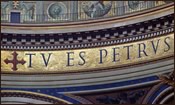An Ex-Catholic’s Guide to the Papal Succession
 I was once a Catholic; I went to a Catholic school. I recall receiving my first Holy Communion on a bright Spring morning; all the children taking part were obliged to have a banner made by their families proclaiming their love and support. My Swedish grandmother, though she was Lutheran, made my banner. It read:
I was once a Catholic; I went to a Catholic school. I recall receiving my first Holy Communion on a bright Spring morning; all the children taking part were obliged to have a banner made by their families proclaiming their love and support. My Swedish grandmother, though she was Lutheran, made my banner. It read:
“God made us a family. We love one another. We forgive one another.”
This faded tapestry still hangs in my bedroom in my parents’ home, a reminder of love that lingers despite the passing of years and of people.
I recall the kind people who worked at my school; there was an aged nun named Sister Jeanne d’Arc who taught me how to play the piano. She was firm but not strict; I believe much of my love of music came from my awkward fingers plonking out hesitant melodies on old ivory keys in her musty practice room.
I remember the Catholic Church I attended when I lived in London. It was a rare place: it was a venue where all socio-economic groups mingled. The middle class, the unemployed, the native born and new arrivals all gathered together there to pray. Father Godfrey, Father Michael, Father Tony, Father Norbert – all were gentle and generous men who cared deeply about their flock. The church itself was a Victorian neo-Gothic structure but not outrageously ornate; after a time, the parish received some money for a much needed refurbishment. An aesthetically pleasing lick of paint was daubed on its 19th century beauty. My parents renewed their wedding vows there not long after the work was completed: I remember the flickering candles, the freshly clean Victorian tile beneath their feet, the statues of saints all the brighter for their exquisite restoration.
My attachment was not just sentimental. Catholic teachings contain a number of positive social doctrines. For example, Pope Leo XIII wrote in his 1891 encyclical Rerum Novarum about the need for the equitable treatment of labour and said that the State had an obligation to look after the poor. The free market, Rerum Novarum states, is not everything: this sounds refreshing to modern ears, which are weary of the pablum from bankers and politicians which drones otherwise. Rerum Novarum is a moral document that every government, regardless of political complexion, should study and consider.
Given my history, it was with considerable reluctance that I left Roman Catholicism behind. Despite the warmth, the familiarity and the memories that I had built up within the Mother Church’s confines, I could not ignore its treatment of women, homosexuals and the way that it covered up its scandals, particularly the abuse of children in its care. I sought refuge and found some solace in the Church of England and its solid grip on moderation: although it has its problems, and its struggles for fair treatment are not nearly over, at least there is some passable resolution to these questions that can be seen in the middle distance. Some parts of the Anglican Communion, such as the Episcopal Church in the United States, have made great progress.
In contrast, the choice of Cardinal Ratzinger to succeed Pope John Paul II plunged Catholicism into night. There was always an element of murk and mystery which surrounded the Vatican, things hidden behind clouds of incense; “The Godfather 3” was a subpar film but nevertheless its portrayal of intrigue, scandal and even murder within the Church rang true. During the Renaissance, scions of the Borgia family became popes, so did the Medici: both houses were less than ethically salubrious. The Vatican, then as now, is a surpassing expression of the idea that only God is perfect. Yet Ratzinger, as Benedict XVI, did not throw open the doors, nor did he let sunshine penetrate its darkened corridors. If anything, his detached, somewhat professorial manner only made the gloom deepen. Pope John Paul II was credited with witty sayings such as “Stupidity is also a gift from God, but it mustn’t be misused”, whereas his successor was notable for boneheadedly driving a wedge between the Catholic and Muslim communities by quoting the Byzantine Emperor Manuel II Paleologus in a less than judicious way.
 Perhaps thanks in part to Benedict’s reactionary temperament, the Vatican is still one of the few places in which the past not only lives, it’s nearly as tangible as the present. The unearthing of deceased Popes began the moment that Benedict XVI announced his retirement: it was pointed out he was the first Pope to resign since Gregory XII in 1415, which was done to heal a schism in the church. Some have qualified this statement by saying Benedict is the first Pope to quit voluntarily since Celestine V in 1294. There is an additional argument which could be made: there was a period in which there were several Popes all vying for recognition. One of them, Felix V, gave up his claim in 1449 and was later made a cardinal; this act brought the period of multiple popes to an end. One would think that with this track record that there would be little dispute that the Pope can quit: as is apparent, for a time they were abdicating left, right and centre. As with anything else associated with the Catholic Church, this is not the case. I have visited St. Peter’s Basilica, and inscribed on the inside of its main dome are Christ’s words to Peter: “Tu es Petrus”. This translates as “Thou art Peter”: as any Catholic schoolboy can tell you, Peter means “rock”. This is followed by Jesus’ addendum, “et super hanc petram aedificabo Ecclesiam meam et tibi dabo claves regni caelorum”, which means “And upon this rock I shall build My Church and I will give you the keys to the Kingdom of Heaven.” These words represent authority: the Popes are referred to as Peter’s direct heirs. The supposed “keys to Kingdom of Heaven” are part of the Papal seal. Some Catholics no doubt argue or at least feel that such an obligation cannot be simply cast aside. But the Pope is also supposedly infallible on matters of doctrine “concerning faith or morals”, or has been since the First Vatican Council (1869-1870). But in the end, the arguments are for nought: Benedict will leave at the end of the month. There will be a conclave of the College of Cardinals, a cloistered event which in the era of “Big Brother” should likely be televised and narrated by someone from Newcastle until they’re ready to proclaim “Habemus Papam”. That’s that.
Perhaps thanks in part to Benedict’s reactionary temperament, the Vatican is still one of the few places in which the past not only lives, it’s nearly as tangible as the present. The unearthing of deceased Popes began the moment that Benedict XVI announced his retirement: it was pointed out he was the first Pope to resign since Gregory XII in 1415, which was done to heal a schism in the church. Some have qualified this statement by saying Benedict is the first Pope to quit voluntarily since Celestine V in 1294. There is an additional argument which could be made: there was a period in which there were several Popes all vying for recognition. One of them, Felix V, gave up his claim in 1449 and was later made a cardinal; this act brought the period of multiple popes to an end. One would think that with this track record that there would be little dispute that the Pope can quit: as is apparent, for a time they were abdicating left, right and centre. As with anything else associated with the Catholic Church, this is not the case. I have visited St. Peter’s Basilica, and inscribed on the inside of its main dome are Christ’s words to Peter: “Tu es Petrus”. This translates as “Thou art Peter”: as any Catholic schoolboy can tell you, Peter means “rock”. This is followed by Jesus’ addendum, “et super hanc petram aedificabo Ecclesiam meam et tibi dabo claves regni caelorum”, which means “And upon this rock I shall build My Church and I will give you the keys to the Kingdom of Heaven.” These words represent authority: the Popes are referred to as Peter’s direct heirs. The supposed “keys to Kingdom of Heaven” are part of the Papal seal. Some Catholics no doubt argue or at least feel that such an obligation cannot be simply cast aside. But the Pope is also supposedly infallible on matters of doctrine “concerning faith or morals”, or has been since the First Vatican Council (1869-1870). But in the end, the arguments are for nought: Benedict will leave at the end of the month. There will be a conclave of the College of Cardinals, a cloistered event which in the era of “Big Brother” should likely be televised and narrated by someone from Newcastle until they’re ready to proclaim “Habemus Papam”. That’s that.
Or is it? After all, Benedict will be living in a refurbished apartment in the Vatican; he will be a neighbour to the next Pope. It is entirely possible that while he lives, he will be seen as the “true pope” by people who oppose his successor’s policies, particularly if those are out of kilter with a traditionalist point of view. To be fair to Benedict, he has said he’d like to spend the remainder of his life in prayer; prayers, however, can be heard by others than to whom they are directed. Is this interlude a break with Papal history or merely a latter day repeat of the period in which there were several Popes at once? Given this potential handicap, could there be a charismatic liberal Pope and a period of reform in which openness and transparency become, if one will pardon the pun, cardinal virtues?
Maybe, maybe not. Nevertheless it does matter: while the Pope is no longer the arbiter of Christendom, and he can’t stand at the gates of Rome like Leo the First and command Attila the Hun to leave the city be, he still can influence the priorities for over a billion worshippers. He can speak about moral and social issues in a way which few can; there could and should be another Rerum Novarum for the Twitter age. He has the chance to sustain and nurture the institutions which provide a beneficent upbringing like mine. He has the opportunity to extend Jesus’ dictum of “Love one another as I have loved you” to whole segments of humanity that have been hitherto shunned or misunderstood by the Church, and by so doing thus remove the necessity for those who love justice as well as God to leave its embrace. He can be a true disciple; he can also lead. Time will tell.


